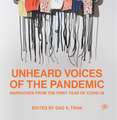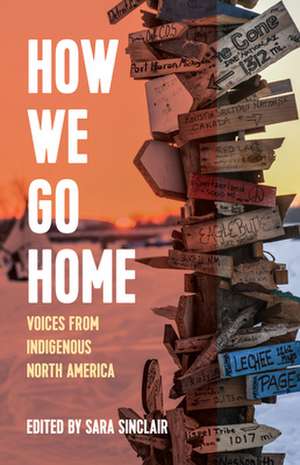How We Go Home: Voices from Indigenous North America: Voice of Witness
en Limba Engleză Paperback – 26 oct 2020
In myriad ways, each narrator's life has been shaped by loss, injustice, and resilience--and by the struggle of how to share space with settler nations whose essential aim is to take all that is Indigenous.
Hear from Jasilyn Charger, one of the first five people to set up camp at Standing Rock, which kickstarted a movement of Water Protectors that roused the world; Gladys Radek, a survivor of sexual violence whose niece disappeared along Canada's Highway of Tears, who became a family advocate for the National Inquiry into Missing and Murdered Indigenous Women and Girls; and Marian Naranjo, herself the subject of a secret radiation test while in high school, who went on to drive Santa Clara Pueblo toward compiling an environmental impact statement on the consequences of living next to Los Alamos National Laboratory. Theirs are stories among many of the ongoing contemporary struggles to preserve Native lands and lives--and of how we go home.
Din seria Voice of Witness
-
 Preț: 137.95 lei
Preț: 137.95 lei -
 Preț: 124.26 lei
Preț: 124.26 lei -
 Preț: 137.06 lei
Preț: 137.06 lei -
 Preț: 163.45 lei
Preț: 163.45 lei -
 Preț: 135.67 lei
Preț: 135.67 lei -
 Preț: 136.90 lei
Preț: 136.90 lei -
 Preț: 164.08 lei
Preț: 164.08 lei -
 Preț: 152.71 lei
Preț: 152.71 lei -
 Preț: 208.43 lei
Preț: 208.43 lei -
 Preț: 324.86 lei
Preț: 324.86 lei -
 Preț: 345.50 lei
Preț: 345.50 lei -
 Preț: 351.87 lei
Preț: 351.87 lei -
 Preț: 95.56 lei
Preț: 95.56 lei -
 Preț: 118.49 lei
Preț: 118.49 lei - 8%
 Preț: 495.66 lei
Preț: 495.66 lei - 8%
 Preț: 492.59 lei
Preț: 492.59 lei - 8%
 Preț: 495.66 lei
Preț: 495.66 lei -
 Preț: 116.81 lei
Preț: 116.81 lei
Preț: 106.88 lei
Preț vechi: 136.29 lei
-22% Nou
20.45€ • 20.95$ • 17.01£
Carte indisponibilă temporar
Specificații
ISBN-10: 1642592714
Pagini: 320
Dimensiuni: 140 x 213 x 25 mm
Greutate: 0.45 kg
Editura: Haymarket Books
Seria Voice of Witness
Cuprins
CONTENTS
EDITOR'S NOTE
INTRODUCTION, by Sara Sinclair
EXECUTIVE EDITOR'S NOTE, by Mimi Lok
MAP
Gladys Radek, Terrace, Gitxsan / Wet'suwet'en First Nations
?When Tamara went missing, it took the breath out of me.?
Jasilyn Charger, Cheyenne River Sioux
?My son's buried by the river. . . . I vowed to him that he's going to be safe, that no oil was going to touch him.?
Wizipan Little Elk, Rosebud Lakota
?On the reservation, you have the beauty of the culture and our traditional knowledge contrasted with the reality of poverty.?
Geraldine Manson, Snuneymuxw First Nation
?The nurse was trying to get me to sign a paper to put our baby, Derrick, up for adoption.?
Robert Ornelas, New York City, Lipan Apache / Ysleta del Sur Pueblo
?A part of the soul sickness for me was being ashamed. . . . What we were being taught about Indians was so minimal and so negative.?
Ashley Hemmers, Fort Mojave Indian Tribe
?I didn't work my ass off to get to Yale to be called a squaw.?
Ervin Chartrand, Selkirk, Métis/Salteaux
?They said I fit the description because I looked like six other kids with leather vests and long hair who looked Indian.?
James Favel, Winnipeg, Peguis First Nation
?You're a stakeholder because you've got to walk these streets every day.?
Marian Naranjo, Santa Clara Pueblo
?Indigenous peoples' reason for being is to be the caretakers of the air, the water, the land, and each other.?
Blaine Wilson, Tsartlip First Nation
?When I was twenty-five, thirty, there was more salmon and I was fishing every other day. Now I'm lucky to go once a week.?
Althea Guiboche, Winnipeg, Métis/Ojibwe/Salteaux
?I had three babies under three years old and I was homeless.?
Vera Styres, Six Nations of the Grand River, Mohawk/Tuscarora
?I was a 'scabby, dirty little Indian.'?
GLOSSARY
HISTORICAL TIMELINE OF INDIGENOUS NORTH AMERICA
ESSAYS
- The Trail of Broken Promises: US and Canadian Treaties with First Nations
- ?Indigenous Perspectives on Historical Trauma?: An Interview with Johnna James
- Indigenous Resurgence
TEN THINGS YOU CAN DO
FURTHER READING
ACKNOWLEDGMENTS
Notă biografică
Sara Sinclairis an oral historian, writer, and educator of Cree-Ojibwe and settler descent. Sara teaches in the Oral History Masters Program at Columbia University. She has contributed to the Columbia Center for Oral History Research’s Covid-19 Oral History, Narrative and Memory Archive, Obama Presidency Oral History, and Robert Rauschenberg Oral History Project. She has conducted oral histories for the Whitney Museum of American Art, New York City Department of Environmental Protection, and the International Labor Organization, among others. Sara is co-editor ofRobert Rauschenberg: An Oral History, published with Columbia University Press in 2019.
